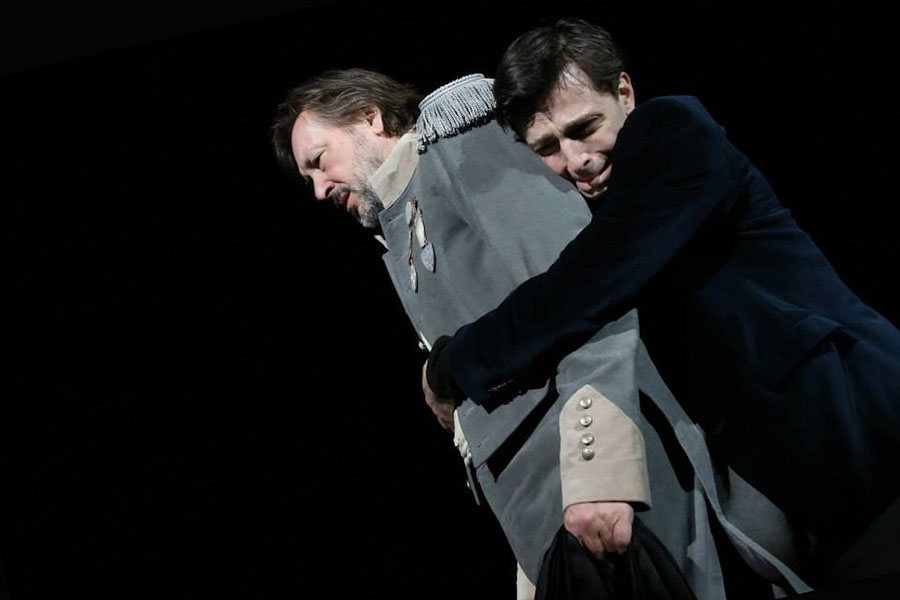A review of Örkény Theatre’s production of Shakespeare’s Hamlet (dir. Bagossy László) by Hujbert Gellért
I came out of Örkény Theatre with mixed feelings. Previously, I had prepared myself to be ready to compare it to the performances or adaptations I had already seen, yet after this experience, I had a hard time collecting my thoughts on the matter. I enjoyed the performance thoroughly, and not just for the reasons I am about to list here, but for the enormous amount of contemplation it gave me just to assemble such a list.
First, I wish to speak about a matter that may cover all of the production itself. I had never seen or heard Nádasdy Ádám’s translation before, and I must say I liked it. I know it has already been repeatedly said before that translating Shakespeare has its difficulties not just in the language, or the numerous ‘original’ versions of the plays, but in the unbearable pressure the translator has to endure by being compared to earlier translators. Nádasdy’s translation exceeded my expectations – it was witty, had a good flow, and gave off an overall seamless feeling that was evocative of the pleasure one experiences while reading Shakespeare in English.
But the use of a new translation with more common words was only one tool in Bagossy László’s vision. The whole performance was alive – and by alive, I mean not centuries-old, wrinkled and worn-out, but young, energetic and powerful. I’ve never seen such a young-looking Hamlet in professional theatres (I looked him up, Polgár Csaba is 33). I know Hamlet is supposed to be in his thirties, but several aspects of his character we tend to associate with younger men. He attends a university (which would seem strange for a thirty-something man today), he is not yet married, but courts a noble lady, and, most importantly, he seems to be somewhat immature, someone who has not achieved the wisdom of manhood. The reasons and the solution for this immaturity is the play itself, and yet Hamlet is often shown as a man already wise with experience, whose troubles are merely of an ethical or moral nature. Here, I saw a Hamlet being raised by his experience and struggle from immaturity to sour wisdom.
However, what had the most powerful impact on me was the focus. When directors work on Shakespeare, they tend to focus on certain elements, moral aspects, or characters and build the play up around these focal points. This is especially so in the case of Hamlet, which is one of the most frequently debated, analysed, and produced plays in history. There are several reasons behind this phenomenon: avoiding repetition, giving personal insight on these crucial matters, giving a teaching purpose to the production, or simply having to cut some of the play away to shorten it. I was delighted to see, however, that Bagossy tried to avoid choosing a focus. I do not mean to say that he did not cut the play – he had to, it is quite long –, but he did not leave any of the original elements out for the sake of highlighting a single moral issue, or God forbid, squeezing a new meaning into the story. We did not miss any important elements of the original Shakespearean idea, neither in regards to the story, nor in regards to the moral debate and tragedy behind it.
I conclude with saying that I saw one of the best performances of Hamlet yet. Bagossy’s adaptation tackled the problem of modernizing a Shakespearean play pretty well, did not turn out to be just a Hollywood-style modernisation, and managed not to lose the play’s original identity. Personally, I highly value this feat, as I have always felt that that Shakespearean tragedies need to be introduced to all generations, but not at the cost of heavily altering them.
Read our other Hamlet reviews here, and all theatre reviews here!
Images taken from Örkény Theatre’s Hamlet gallery, photographed by Gordon Eszter and Dömölky Dániel.




